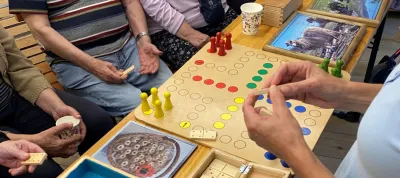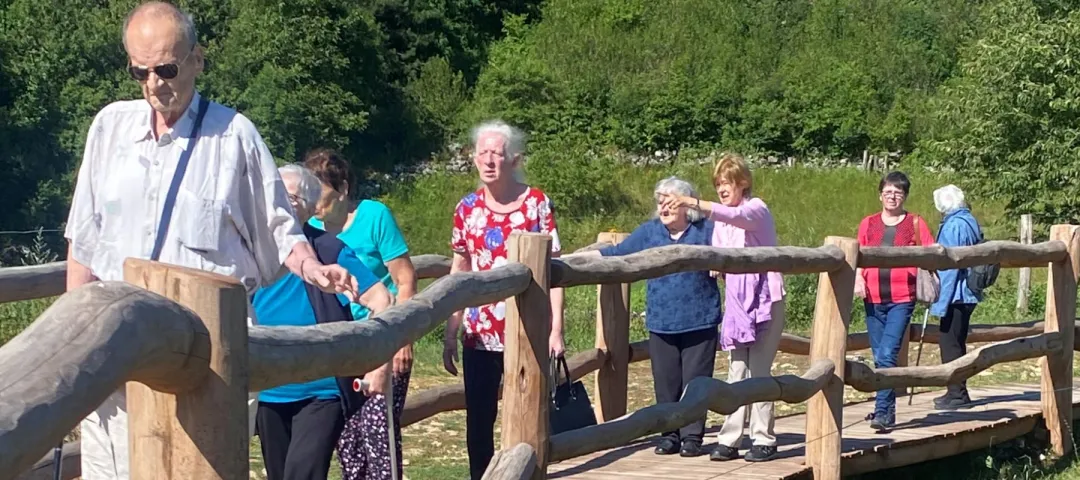General information
RDP Priority
- P6. Social inclusion and local development
RDP Focus Area
- 6A: Diversification & job creation
RDP Measure
- M16: Cooperation
Beneficiary type
- Farmer / land manager
Summary
Three farms and three institutions cooperated on the development of a new social service focused on vulnerable groups: disabled people, children with special needs, the elderly and people with dementia and their relatives. The purpose of the project was to help vulnerable groups to maintain and improve their cognitive functions.
The project partners worked together to create programmes for farms on the topic of primary prevention for improving cognitive functions. They also developed support tools that these farms will be able to use in the future when carrying out activities with visitors and users of services on the farm who belong to vulnerable groups. This newly developed activity would be an additional source of income for farms.
Results
- Participant farms obtained the skills and tools to empower individuals with special needs by stimulating their gross and fine motor skills.
- The project improved or added new services to farms, significantly contributing to diversifying their income and creating new job opportunities.

Promoter
Kmetija Slavec, Gregor Slavec
Funding
RDP contribution: 74 989 (EUR)
Resources
Documents
Context
The Slavec farm has extensive experience in working with various groups of visitors, but especially with vulnerable groups. This experience was the starting point for thinking about developing a programme for farms that could be used to improve the cognitive functions of visitors who belong to vulnerable groups. This new service would also be an additional source of income for farms.
The programme was developed through a cooperation between the Slavec and Mahne farms, the Solne ranch and three institutions, namely the Ilirska Bistrica home for the elderly, the Slovenian Association for Help with Dementia, and the forestry and woodworking high school of Postojna. The institutions helped to develop the project tools and then trained members of the farms to use them and implement the programme.
The programme focused on vulnerable groups – disabled people, children with special needs, the elderly and people with dementia and their relatives. For people with disabilities, the programme focused on promoting gross and fine motor skills, using hands and palms as basic tools, and promoting compound movements and balance. Motor skills and thinking are combined with various games.
For children with special needs, the programme develops cognitive abilities, recognition, knowledge of numbers and words, and connections. It is about stimulating lower cognitive levels as well as higher ones (combinatorics, linking). It is also important to note that fine motor skills (via games) are encouraged at the same time. This involves encouraging the expression of emotions, using the senses, combining them with feeling and recognising objects and things based on information received with the senses.
In addition to the tools and programmes developed, the Slavec farm built a path to the pasture that allows the youngest, eldest and people with disabilities to visit the pasture. The path is completely flat and surrounded by a protective fence. Hence, it is easy to walk on and provides safety, whether due to health problems or a fear of animals.
Objectives
The aim of this cooperation project was to develop a new service – offered by farms – to support vulnerable groups in maintaining and improving their cognitive functions.
Activities
The activities of the project included:
- Conducting an analysis of farm capabilities and expectations to create suitable activities aimed at improving the cognitive functions of people with disabilities.
- Training farm members to support and manage vulnerable groups, enhancing their cognitive functions.
- Developing programmes and tools for farms to implement primary prevention measures to train cognitive functions in vulnerable groups.
- Evaluating the project and preparing an analysis of the feasibility of transferring project solutions into practice based on evaluation findings within the context of complementary farm activities.
- Sharing knowledge and information with other farms in Slovenia by organising training workshops.
- Documenting the impact of the development aids in strengthening the cognitive functions of vulnerable groups.
- Disseminating project results through various communication channels.
Main results
- The project developed ten support tools to strengthen cognitive function in vulnerable groups.
- Participant farms can now empower individuals with special needs by stimulating their gross and fine motor skills.
- The project improved or added new services to farms, which significantly contributes to maintaining jobs or even creating new job opportunities.
- The project increased the involvement of the local community in activities.
Key lessons
- The project represents a successful collaboration between multiple entities, including three farms and three institutions. This showcases effective networking by bringing together diverse stakeholders with different expertise and resources to work towards a common goal.
- The collaboration brings the agriculture and healthcare sectors together and demonstrates the power of cross-sector networking in addressing complex social issues like the cognitive health of vulnerable groups.
- Navigating an EU funding application process can be complex; therefore, thorough preparation is imperative. This includes compiling detailed project proposals that align with EU priorities and ensuring compliance with all regulatory frameworks. Engaging stakeholders early in the process can significantly enhance the quality of proposals and increase the chances of securing funds.
